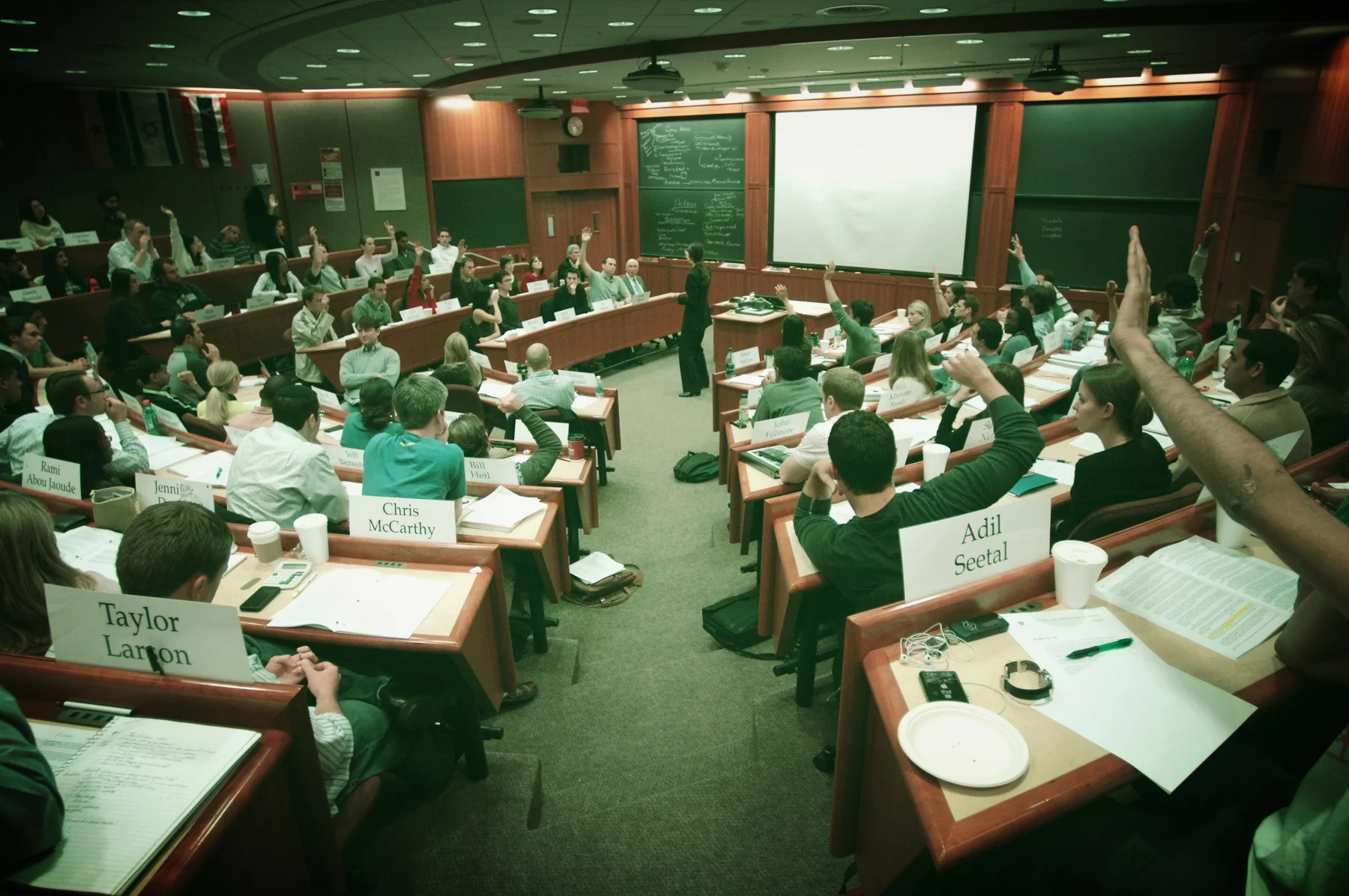Monday MBA Resource: "Happy Ambition" by Ben Casnocha
Time for another edition of Monday MBA Resource, where we share the things we are reading, watching, and listening to that might be helpful to people in the MBA community. Some are more focused on applicants, others are better for students, some for both - but all of them offer great insights that are worth soaking up. Last week we broke down the Knowledge @Wharton podcast and people seem to really be enjoying it. Let's hope we can keep it up with this next entry, which is the article:
"Happy Ambition: Striving for Success, Avoiding Status Cocaine, and Prioritizing Happiness" by Ben Casnocha.
Monday MBA Resource: Knowledge@Wharton Podcast
Trying something new for Mondays, which is to pass along my favorite MBA resource that I found that weekend. It's a good way to start the week, a way to get great tools out into the MBA community, and, quite frankly, a good for me to remember these items myself so I can show them to future candidates and corporate clients.
Today's Resource is the Knowledge@Wharton podcast.
Most Common Mistakes on Round 1 MBA Essays
I just saw a whole lot of MBA essays over the past few months and now that Round 1 is (mostly) finished, I thought it would be an interesting exercise to jot down the most common mistake I saw for each of the most common essays I worked on with clients. Round 2 clients can get a leg up by simply avoiding these traps.
Why MBA Candidates Should Ditch the Phrase "Safety School"
Today we are going to take the term "Safety School" and put it through the shredder. Reasonable minds can probably disagree on what the term should mean, but what I want to do is explain why I personally do not believe that "Safety School" should be part of an MBA applicant's lexicon.
First, the term is used incorrectly about 90% of the time. When applicants say "safety school," what they often mean is "a school that is really good but that hopefully I have a better chance to get into." If you are using the term this way, just as a shorthand, that is fine but make sure that it's clarified with anyone you are working with, such as your consultant. The real use for "safety school" should probably translate more or less to "a sure bet." With college applicants - due to the pressure to be enrolled on an exact timeline (following high school graduation, of course) - a "safety school" is a very real thing; you simply have to pick some programs that you are sure to get into. Often this means a program from that student's home state, sometimes with sheer numerical thresholds (lacking holistic admissions processes). If you go to school in California and have a certain matrix of GPA and test scores, you can feel "safe" about getting into certain Cal-State programs. That's a safety school. Ross and Duke Fuqua are not safety schools. Now, what if you are using the term in the right way?
Can I get into Harvard Business School with a 650 GMAT?
Getting a job in the entertainment industry with an MBA
Working in the Entertainment Industry is the ultimate career goal for some. The Glitz, the Glamour, and the Gluttony beckon folks from far and wide to Hollywood, New York, Canada, London, and even Bollywood to work. It is a well-known truism that breaking into this super-fortified fortress of employment is not just difficult, it’s notoriously the most impossible industry in the world to catch a break and get your foot in the door. How can you find a way in?
Weighing the pros and cons of getting an MBA outside of the US
Heads up, today's post is for the Americans among us, as we have been getting a lot of questions about international MBA programs.
If you are a US citizen trying to decide where you want to get your MBA degree, it can be tempting to think about schools outside the USA.
After all, the world knows no boundaries thanks to technology and a global marketplace. Right? Spending a couple of years in Spain, England or Asia also sound like nice places to see new things and meet new people while you sharpen your business acumen. And since most programs at reputable business schools are in English, you won’t face the language barrier that may have stopped you otherwise. Seems like a slam dunk? Read on ...
Tips for reapplying to business school: Getting feedback, determining why you got dinged
Use a matrix approach to show balance across your MBA application
One thing we generally recommend to clients is to use a traditional matrix approach to ensure you are communicating a balance of core essentials to the MBA admissions committees. If you use this approach, you will be much more organized as you apply and will also be able to quickly ascertain where you may be coming up short.
How does it work?
Tackling the “other” questions inside the business school application
With the release of the 2016 HBS application, it is clear that shortening the number of essays is a trend that is here to stay for now. With only one essay on the HBS application again this year, it is becoming more important than ever to not only communicate effectively and concisely, but also to leverage the balance of the application (and of course the interview) to stand out from the crowd.
Should I apply Early Action / Early Decision?
Deciding when to apply to school can often get applicants mentally twisted, as they attempt to inject strategy into the process. We will speak more specifically to this decision in another post, but at this time of year, it makes sense to first talk about early action. More and more schools it seems, have an early action option which throws yet another wrench into the round one vs. round two vs. round three discussion.
How do I decide which top MBA programs to apply to?
This time of year, the biggest question from clients seems to be about which schools they should be targeting for application. We understand that with so many choices out there, both domestically in the US and internationally, it can be a bit overwhelming. Time and time again, we find ourselves having to remind everyone of the one key word to focus on when choosing schools: FIT.
11th-hour MBA application advice: before you hit submit on that app
Here are our list of best tips and practices before tapping submit on your apps, so you don't get caught with your pants down an hour to go before the deadline.
We always tell our clients, do not wait until only a few days before the deadline to begin completing your online app, because you just may have an "oh-snap" type moment.
5 Pieces of Advice for MBA Reapplicants
MBA Candidate Differentiation: Do NOT Try This at Home
Time to go full PSA here. I'm talking all alarms ringing, sirens, whatever it takes to get your attention. By "you" I mean: anyone applying to business school. You need to stop doing something immediately. Here it is:
Stop trying to "differentiate" yourself.
Or at least, stop doing it without a professional by your side. Let's dive into the 4 Rules of Differentiation before someone gets hurt.
Rule #1 - Do not "differentiate yourself" with a panicked career change.
Rule #2 - Listing a hard job to get as your short-term goal is not "differentiating."
Rule #3 - The "quick and easy" place to differentiate is in the WHY of your long-term career goal.
Rule #4 - The real, pure way to differentiate yourself is to do the app right.
Applying Round 1? This Year's MBA Deadlines Are Earlier Than You Think.
Normally, once the fireworks go off on the 4th of July, that's our signal to start digging into the apps in earnest, as "October" Round 1 deadlines are a few months away. However, in recent years, the deadlines keep getting earlier and earlier. I know I had to really reset my own calendar given these changes, so I figured I'd do a public service and list them out here, calling special attention to the front-loaded nature of the deadlines.
How to (Actually) Differentiate Yourself on your MBA Applications
Time to break out an annual PSA here. I'm talking all alarms ringing, sirens, whatever it takes to get your attention. By "you" I mean: anyone applying to business school. You need to stop doing something immediately.
Here it is: STOP TRYING TO "DIFFERENTIATE" YOURSELF.
Or at least, stop doing it without a professional by your side. Let's dive into the 4 Rules of Differentiation before someone gets hurt.
What the Stanford GSB Wants - a True Moral Compass
If you read our editions of our “How to Apply to Harvard Business School” and "How to Apply to Stanford GSB" guides, you already know that cultivating a real reason for applying to an elite MBA goes week beyond the school's name, rank, and prestige. But more than any other MBA program in the world (yes, even HBS), GSB looks beyond having a great GMAT score, a summa cum laude GPA and a blue chip name as your employer. While these are respectable measures of a person’s perceived worth, they are not good enough reasons to apply to GSB.
Why is this?
Simply put, you could someone with a mis-calibrated moral compass or worse, what your colleagues might call an "asshole" (more on the asshole test here and the true cost of being an asshole here). That's right - more than any other school in the world, Stanford has a visceral aversion to those who define themselves by their accomplishments, as opposed to the innate values and beliefs that drive those accolades. Apparently, Stanford has their pick of the litter and they can afford to stand absolutely resolute in their aversion to those whose moral compass points true south.
























